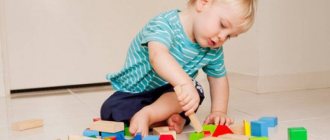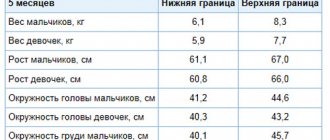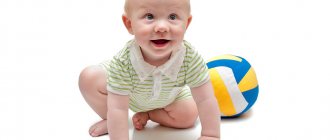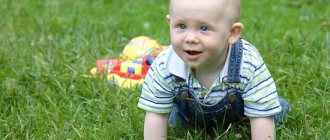When a child turns 8 months old, parents notice many changes - both physiological and psychological. Although each baby develops according to its own individual schedule, there are some generalized parameters regarding the norms of growth and weight gain, skills and abilities, and psycho-emotional manifestations.
Baby Development Stages at 8 Months: Boys and Girls
Physical development of a child at 8 months: height and weight
In the eighth month of life, many mothers note that the child is not gaining too much weight and height, but still meets the norm. The average weight for an 8-month-old boy is 9 kg, while girls on average weigh around 7.5 kg. A boy at this age usually has a height of 70 cm, and girls are closer to 68 cm. When compared with the previous month, the height indicators change by a maximum of 2 cm, and the weight changes by 500 g.
Table of norms
Most toddlers have their first 4 teeth. But if suddenly this has not happened to your baby yet, do not worry, this is normal.
Mental development of a child at 8 months
The following indicators can indicate normal psycho-emotional development:
:
- Clearly correlates emotions with certain feelings - resentment, hunger, boredom, joy, pain. So, he may be offended by a loud cry. The main task of parents is not to ignore the child’s crying. You should not adhere to the stereotypical “grandmother’s” method, as if the baby is trying to manipulate. Not at all, with his crying he is trying to call his parents for help.
- Responds to conversation and makes sounds. Accumulates passive vocabulary.
- Recognizes familiar faces.
- Afraid of strangers. May turn away or cry.
- Loves to look at himself in the mirror.
- Begins to associate vowel sounds while “talking.”
- Knows his name and responds by turning his head when addressed.
- Produces consonant sounds such as “m” or “b”.
- Learns about the world through taste and touch - pulls all kinds of objects into his mouth.
- Understands basic words - mom, dad, woman, ball, dog, etc.
- Explores the concept of cause and effect. For example, he actively observes what happens to an object if it is thrown from a height. Surely mothers know cases when a baby throws his own shoes out of the stroller on the street.
- Shows strong affection for mom and may react by crying if she leaves.
- Babies at this age are just discovering cause and effect and love to experiment with how to succeed in anything they do. They like interactive toys that allow them to achieve different effects. For example, pressing a button and making noise, opening a box and finding a toy inside.
Nutritional Features
In order for the baby to fully grow, develop and weigh normally, he needs to eat every four hours, taking a break of eight hours for night sleep. The first feeding is immediately upon awakening. After this, the baby stays awake for about three hours. It is better to devote this period of time to useful games, massage, and gymnastics. But a special approach is needed. You cannot force an active child to listen to readings or look at books if he categorically does not accept this.
Regardless of the type of feeding, meat complementary foods should be introduced in the eighth month. The baby's diet must be supplemented with chicken yolk. But you should not stop breastfeeding or highly adaptive formula milk. It is necessary to expand the range of fruit juices and purees. You cannot give several types of purees at once - this will create an additional burden on the child’s stomach. It would be useful to discuss the peculiarities of nutrition and development with an experienced pediatrician.
What can a baby do at 8 months?
- Pass objects or toys from one hand to another.
- Roll over from your back to your stomach and vice versa.
- Sitting without support.
- Lie down from a sitting position and vice versa.
- Try to take steps independently when touching the floor.
- Lean on a bench or other piece of furniture and stand on its own legs. He can also take his first steps while holding onto the same furniture.
- Rock back and forth on your hands and knees.
- May begin to crawl backwards.
- Try to crawl or already confidently do it.
- Strongly grasping objects, pushing or throwing them.
- Hit toys against each other or against the floor, observing the reaction.
- He actively waves his arms, for example, he knows the rhyme “Ladushka”.
- Can put its components on the pyramid's trunk.
- Sit on the potty for a short time and even do “your own thing.”
- Motor skills are developing - now the baby can pick up some objects with two fingers.
- He can occupy himself with some activity for just a few minutes.
If your baby isn't crawling yet, don't worry. It is normal for children to develop at different times, especially for “big” achievements such as crawling and walking. By 8 months, most babies are crawling, but if your baby hasn't done this yet, that's normal.
You can stimulate your baby by allowing him plenty of tummy time and placing a few toys out of reach to encourage crawling. But it's also great to let your baby develop at his own pace.
Skills and abilities
The main achievements of an 8-month-old baby include:
- the ability to crawl quickly. Some children do this while holding a toy in one hand;
- sit and stand up on your own, holding onto the wall of the crib or your mother’s hand. A fall does not frighten a child: he does not cry, but tries to get up again;
- mastering the “tweezer” grip: the ability to grasp a small object with three fingers, and not with the whole palm;
- attempts to imitate adult speech: ma-ma, ko-ko, ba-ba, aw-aw.
In addition, at 8 months, most babies are able to:
- stand with support;
- roll over in different directions;
- spend a long time working with toys independently: disassembling and assembling them, inserting and laying out parts, removing lids from boxes and cans;
- it’s easy to take a toy and transfer it from one hand to another;
- throw an object and observe where it lands;
- hold a toy in both hands. If you offer the baby another object, he will let go of one of the previous toys and take a new one;
- express emotions: laugh when they play with him or cry if something doesn’t work out;
- attract attention by whining or throwing toys;
- listen to the conversation of adults, distinguishing the intonation of speech. Communicating with loved ones in a raised voice can upset the child, and he will cry. Friendly dialogue, on the contrary, calms the baby;
- recognize yourself in the mirror;
- point a finger at the thing being talked about;
- drink from a cup. Eating pieces of solid food while holding the food in your hand;
- understand the purpose of objects that are often used, for example, plates, spoons, cups, etc.;
- sit on the potty with the help of adults;
- look for an object hidden in front of his eyes;
- recognize familiar melodies, listen to quiet sounds;
- distinguish between your name and the names of loved ones;
- understand the meaning of the words “give”, “on”, “yes”, “no”, “hold”, “go” and other concepts often used when communicating with a baby;
- recognize parents and loved ones among strangers;
- at the request of adults, perform the learned movements: “Give me a pen”, “Bye-bye”, “Okay”.
When should parents of a baby be concerned?
Although each child develops differently, you should still monitor his development and soberly assess the situation.
So, if your baby exhibits any of the following signs or symptoms, be sure to talk to your doctor about them
:
- Does not try to reach objects that surround him.
- Doesn't show affection for mom.
- Doesn't respond to sounds.
- Cannot put objects, such as a rattle or toy, into the mouth.
- Doesn't make basic sounds.
- Flips from back to stomach and in the opposite direction are not possible.
- Doesn't laugh or make happy squeals.
- Doesn't move his head easily, all movements seem heavy.
- Doesn't gain weight.
You shouldn’t stress yourself out and imagine the most terrible pictures if at least one of the above points is found in your baby. This is an erroneous “parental diagnosis” in 90% of cases. On the contrary, this means one thing - seek help from a qualified pediatrician or specialist who will clearly explain the issue.
Important! Do not listen to the opinions and “diagnoses” of others, according to whom your child is a little “different”. Listen to the opinion of only a specialist.
8 month old baby routine: normal day
What does a typical day in the life of an 8-month-old baby look like?
We suggest looking at an approximate daily schedule
:
- 7 am - awakening, morning procedures and breakfast (depending on the type of feeding).
- 8 am – time to wake up, play, study surrounding objects.
- 9 am - morning sleep.
- 11:00 – wake up, lunch, skincare procedures.
- 13:00 – second nap.
- 15:00 – feeding, developmental activities and play time.
- 16-18 – walk in the fresh air.
- 20:00 – dinner, hygiene procedures, massage, getting ready for bed.
- 21:00 – sleep.
Basics of caring for an 8 month old baby
As before, the baby is given hygienic procedures - washed, washed, some have their teeth brushed, put on a potty, cut off overgrown nails, and bathed in the bathroom.
Many children by this age leave most of their bowel movements in the potty. Therefore, diapers leave mother and baby alone a little and fade into the background. Since your baby crawls all day, he should wash his hands frequently, keeping them clean and safe.
Feeding and nutrition
By 8 months, your baby will begin to gradually transition to solid foods other than breast milk or formula. The biggest development this month is that your baby's hand is developing more, so he can pick up food with his index finger and thumb. This new skill opens up a whole world of food possibilities! You can start encouraging your baby to finger foods such as sweet peas, small diced fruits, sliced meats and cheeses.
Despite the transition to more dry matter, your baby will still need the nutrients he can get from breast milk. This means that your baby should drink about 700 ml of breast milk or formula every day. Your baby can get what he needs by continuing to drink direct or bottle breast milk throughout the day. Offer breast milk or formula before offering solids, especially during the day and at night.
Mom can also continue to introduce new foods to her 8-month-old baby, increasing variety in the diet and introducing more textures and flavors. Keep in mind that not all children's teeth grow at the same time. If your baby has already grown teeth (some have 4 already), he may be ready for textured foods, but if he is still growing them, you should stick to softer foods for now.
Now mom can offer her baby “assorted porridge,” that is, prepared from various grains or vegetables, and even fruits. Now regular mashed potatoes can be decorated with other healthy vegetables. For example, carrots, zucchini, cabbage. By the end of the eighth month, you can offer dairy products - kefir and cottage cheese, which can subsequently replace one feeding. A package of cottage cheese or a bottle of kefir can be an excellent help in situations when mother and baby are away from home and feeding time has come. Plus it's useful.
Most likely, your mother will buy dairy products in the store, so you should adhere to strict recommendations - choose trusted brands and carefully study the composition and expiration date. Unfortunately, there are countless unscrupulous suppliers.
Here are some more tips to keep in mind during this food transition.
:
- On average, you have to offer your baby a new food several times before he accepts it. So if it doesn't work out for you at first, it doesn't necessarily mean your baby hates the food - he may need a few more feedings to get used to the new taste and texture.
- Bowel movements may also look different as they eat a larger variety of foods.
- Start with 1-2 tablespoons of baby food two to three times a day when you start feeding, and gradually increase to 4-5 tablespoons per feeding as your baby grows.
- Never force your baby to finish food. If he turns his head away or closes his mouth, don't force him.
- Prohibited are any products that may pose a choking hazard, as well as honey. Children under 1 year of age should not eat honey.
- As soon as you feel that your baby is ready to try, provide him with his own cutlery - a cup and a spoon - so that he learns how to use them. It's never too early to learn table manners, right?
- Don't forget to give new food in the morning.
Try not to experiment in the evening, because the results may be unpredictable. An important rule is to try new food only in the morning or afternoon.
At this age, some children also have difficulty eating and vomiting. Your 8-month-old baby may learn to chew and swallow, or he may become overly enthusiastic about food and forget to chew. If your baby vomits frequently, you should see your pediatrician to make sure there are no medical complications that may be causing the vomiting.
As baby eats more dry matter and becomes more active during this time, he may also show less interest in breastfeeding or become more distracted during feeding. During this period, the mother may wonder: “Is the baby trying to wean?” Some children will wean themselves sooner than others. If you succeed, then try breastfeeding until one year - it is useful.
Try to minimize distractions and reward your baby with care.
:
- Go to a quiet place to breastfeed.
- Use a blanket if it helps.
- Stroke your baby during the process.
- Ask your loved ones not to talk at the moment.
Dream
An 8-month-old baby sleeps on average 13–14 hours a day. Chances are, by this month, your baby will be taking regular, predictable naps—usually lasting two to three hours, but some babies may still nap more often as well.
At this age, your baby has developed a sense of object permanence, which means he understands that mom doesn't disappear when she leaves the room. He also found out that his actions caused certain things. For example, when he cries, he knows that his mother will return to the room and pay attention to him.
This new understanding may cause some changes in your rest as your little one tries to test boundaries or may require extra comfort before bed. Try to be patient and consistent with your 8-month-old baby to help ease the separation anxiety during this time. You may need to offer extra care, such as returning to the room a few more times and rubbing your baby's back or kissing him. If possible, try to stick to established routines without creating new ones that will only confuse your child.
Diet for infants and artificial babies
There are many methods of feeding infants up to one year, but pediatricians are unanimous on one thing - mother's milk should remain a priority. The development and nutrition of a child at 8 months are interrelated concepts. Full development of a baby is impossible without a balanced diet.
The eight-month-old baby continues to feed 5 times a day, rarely waking up for night feedings.
The diet of a breastfed baby is gradually replaced by standard products and less mother's milk is required - during the first morning feeding and before bedtime.
You can offer your baby multi-ingredient porridges (provided that he has already tried each of them separately), cooked with breast milk or baby formula. In a puree consisting of vegetables: zucchini, carrots, cauliflower, pumpkin, it is recommended to add pureed boiled meat. Gradually, in small portions (10-20 g), fish is introduced into the menu.
By the end of the month, the baby’s diet is replenished with cottage cheese and kefir. At 8 months, babies begin to cut their teeth, so you can offer them a tasty “gnawer” - a cracker or a bagel. The artificial baby also receives five meals a day. The first morning feeding and before bedtime are mixtures, the remaining three meals are completely replaced.
It is important to remember that not all meat is suitable for an 8-month-old baby, but only turkey, rabbit, chicken and veal.
New products must be introduced into the baby’s diet carefully, in the sequence recommended by the pediatrician, so as not to overload the baby’s body with food that is difficult to digest.
Salt and sugar cannot be used in their natural form, only as a syrup or solution. The later the child learns their taste, the better. Egg white is an allergen and should not be included in the baby’s diet until the age of 1 year.
Health and safety: a quick reminder for mom
The baby's teeth continue to grow, and this process causes discomfort. Therefore, you should carefully monitor what the baby will try to put in its mouth, easing its own condition. He can put both food products and other dangerous objects in his mouth that can cause choking.
Look and study carefully the room where the baby is, you may find some objects that pose a danger, and remove them altogether.
The following tips will help you this month:
:
- Use locking locks on doors and windows. This will ensure maximum safety for your child.
- Ask visitors to remove their shoes before entering your home. Since you must be sure that the floor on which the child crawls is clean.
- Do wet cleaning often.
- Never let your child eat without supervision.
- Avoid common choking hazards such as playing with coins, other small objects, and controlling food intake.
- Keep an eye on heavy furniture in your home, such as dressers, TV stands and bookcases. When an 8-month-old baby learns to stand up using furniture, the risk of such objects falling on them becomes very real.
- If your child has food allergies, make an appointment with an allergist to learn how to take allergy medications correctly, if necessary.
- Consider potted plants, pet dry food bowls and accessories such as litter boxes that may need to be temporarily moved.
Baby development at 8 months
Many parents believe that a child of 8 months has absolutely no need for development. This is a naive lie! Parents should help the child acquire new skills and actively participate in his harmonious development.
Some useful tips on how to develop a baby at 8 months
:
- Carry the baby in your arms. This will satisfy his curiosity. Comment on everything he is trying to reach out to or is interested in. Wearing is an important component of a child’s psychological development.
- Read children's literature (fairy tales, poems) loudly and clearly, sing funny songs. All this will help expand your vocabulary and will also play an important intellectual role in adulthood. It is believed that by 8 months of age, infants are capable of understanding up to 100 words.
- Talk to your baby constantly. Whatever you do, tell him everything. When you wash the floor, tell them that there is water in the bucket and a mop in your hands; you wash the dishes - that they should be clean and how nice it is when the house is in order; when preparing dinner, arrange a demonstration of vegetables and other products, calling out their names and more.
- Hug your baby regularly throughout the day and tell him how much you love him. This way he will feel confident and protected.
- Walk outside for at least 2 hours, weather permitting.
- Practice walking using a walker. There is an opinion among experts that they are not at all useful, and this is most likely true. In this matter, it is better to consult a specialist and discuss the time and possibility of training.
- Take a bath and exercise at the same time. What does it mean? Place the baby on his stomach in the bathtub and draw water; when the water reaches the baby's limit, he will begin to try to get on all fours so that the water does not touch the spout. Let the baby tap the water with his palms and play with rubber toys. Only in this case should parents closely monitor the baby.
- Teach your child to stand or walk on his hands. To do this, grab it by the legs and carefully lift it up. Release him as soon as you see that he is tired.
- Teach crawling by stimulating it with a variety of brightly colored objects that are moderately out of reach.
- Develop fine motor skills. Let your baby touch different textures - soft books, rubber books and bathing toys, wooden and plastic boxes, fabric toys and other objects.
- Swing your arms in different directions. Your little one will definitely enjoy this fun event.
- Ask your child to repeat your actions - clap, knock, wave, etc.
- Play with musical instruments. Show your child how to use them. Let him beat the drum, play the piano, shake the maracas, beat the xylophone.
- Teach your child to use toys for their intended purpose. So, for example, a doll needs to be rocked in your arms, a car needs to be rolled on the floor, a ball needs to be thrown and rolled.
- Build towers from cubes and help your child build his own cube into a “great building.”
- Show a family photo album and ask your baby to point out people he knows.
- Pay your baby's attention to the different sounds you hear. For example, the noise of trees, cars, airplanes, helicopters, birds, animals, water. Be sure to name the names of the owners of the sounds.
- Do massage, gymnastics and air baths. Don't you know how? Look for recommendations from a specialist in the field.
Video: massage
Care instructions
You should continue daily 2-hour walks with your child, arrange air baths, and do not forget about massage and morning exercises.
Since the baby is now eating solid food, his stool changes. This must be taken into account when offering a potty to your baby. The baby's daytime sleep has been significantly reduced: now he sleeps 2 times for 1.5-2 hours. During periods of wakefulness, the toddler is very active.
Often the child’s body cannot cope with the daily load and at night the baby sleeps poorly and tries to crawl. Parents should be patient and survive this period; over time, the baby’s nervous system will get stronger and everything will return to normal. Before bedtime, you should not engage in outdoor games with your child. You can bathe your baby every other day. The water temperature is 33 degrees. If the baby loves bathing, then you can stay in the bathroom for up to 25 minutes.
To ensure safe water procedures, you need to lay a rubberized non-slip mat on the bottom of the bathtub. If your little one sits well, it is recommended to purchase a bathing chair. It is important to ensure that the child does not swallow water and do not leave the baby unattended for a second while bathing.
Games at 8 months for development
The tips below will tell you how to develop and what to play with your baby during this period.
:
- Hide the toy under the blanket and then ask where it is. Let him show where his favorite toy is hidden.
- Play peek-a-boo. Hide your face behind your hands or cover your child’s face with his own hands, and then open it, saying “where are you?”
- Give your child handy objects or kitchen utensils and let him knock on them, distinguishing sounds.
- Play with the ball. Place the baby on the floor and sit opposite, then roll the ball to each other.
- Learn nursery rhymes. It is clear that the child cannot and will not repeat anything verbally, but he will remember the actions. The most popular and easy rhymes are “Ladushki-Ladushki”, “Magpie-Crow”. Say the verse, and the child will do the necessary actions.
Important! Consider your child's interests and temperament. If your baby doesn't like a game or activity, switch to another activity. You shouldn't force your baby to do something he doesn't like. Respect your child, because you love him.
Video: how to develop a child at 8 months
Development: activities and games
At eight months, the baby listens to music, swaying to the beat. The little one loves games with clapping and waving his hands. Development allows children to close and open boxes.
It is necessary to introduce the baby to new words. Having traced what attracted the child’s attention during the walk, the mother points the child to the object that interested him, calling: “Look, this is a dog.”
Development of children's coordination - rocking on the knees up and down. Playing the “cart” will teach the baby to move on his hands. The mother takes the baby by the legs, and he rearranges the arms, making them a support. But at the first sign of dissatisfaction, the game is stopped.
Fine motor skills are developed by playing with oatmeal or rice cereal poured into a large baking dish “the development of fine motor skills is written in detail in this article.” The child stirs it, passes it through his fingers, and dips his hands into it. But it is important to constantly ensure that the baby does not try to swallow cereals. Therefore, it is impossible to leave one child during such an activity.
Bottom line
This month, keep the following in mind:
:
- Play more music: Your baby's brain is like a sponge right now, so experiment with bringing different types of music into your home and watch your little one dance to the beat.
- Read books and sing songs. Children are learning from words of all kinds right now, so make it a habit to talk loudly to your child, read and sing fun songs, and recite nursery rhymes.
- Go outside. Be outside more often, if the time of year allows. This will broaden the baby's horizons.
- Rest. Every parent needs a recharge, so it's important to take a break from time to time. Ask someone from your family to babysit your child and go on vacation, returning with new strength and pleasant emotions.
Develop your child at 8 months, do not forget to surround him with care and love and as a result he will receive harmonious development.











